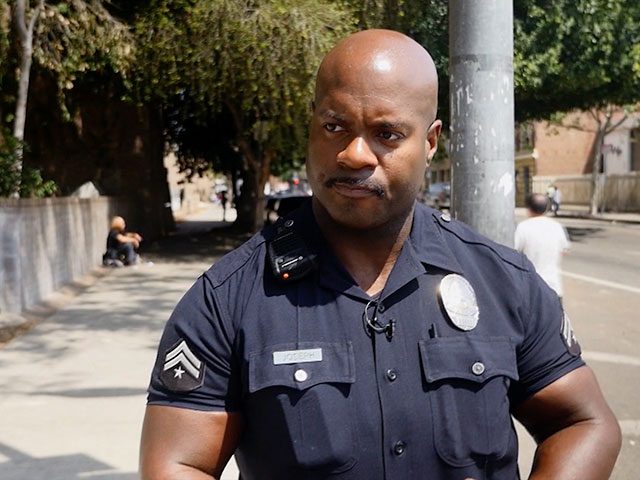Skid Row Cop Has A Different Approach To Policing
GROWING UP WITH GOD’S HEART FOR OTHERS
Deon grew up in Long Beach, CA, with 2 brothers. In addition, at any given time during those years, there were 17 foster children coming and going in their household. His motherhelped raise 41 foster children and 3 grandchildren, and on the side, she helped feed the homeless. “It was wonderful to watch how my mom would use the love of Christ, an unconditional but un-patronizing style of love, to help heal the hearts of these children.” His father, who grew up impoverished in the deep South, also cared about people. He would hire people coming out of prison who were desperate for a job in his construction business – “He thought everybody deserved a second chance.” All this caring for people would eventually be patterned in Deon.
The family attended church regularly, and at age 7, Deon gave his life to Christ. “The pastor kept saying how much Jesus loves us, and out of nowhere, I just felt warm inside and started crying. I wanted that love and never turned back.”
In his early 20’s, he met his wife and became an LAPD officer. Deon was eventually assigned to the downtown Los Angeles Skid Row district. “It was as if I had crossed over into Dante’s Inferno, Mad Max Thunderdome, and any horrific disaster movie you could think of. I saw half naked women, defecating on the sidewalk, men peeing everywhere, bonfires, people smoking crack in rows and rows and rows. A fight broke out in front of a patrol car. I just starting praying in my spirit, ‘God get me the heck out of here. I can’t do this.’ Inside the police station, it was even worse. Drug dealers fighting, and the smell was overpowering. For 2 months I had to work the front desk, and it was a mad house.”
After a month or two “I realized I was home. I knew these people already. They were like the homeless my mom had fed. The people kept coming to me, and I developed this heart and desire to creating an environment for them that’s conducive to change in their lives. But, it was not going to be an easy journey.”
A DIFFERENT APPROACH TO POLICING
“One day, while in my patrol car while I’m watching these drug dealers gambling, I just prayed, ‘God, I don’t know how to fix this. I want to create an environment conducive to change. So, I pulled out some anointing oil, and I poured it on the street. And while I’m praying, I open my eyes and about ¾ of the drug dealers had left. As I sat there the rest of them left. I parked my car, got out, walked around, and I kept doing it until by the end of my shift not one drug dealer returned to the block. It gave me an idea called the ‘sit-down technique’ where basically I would take over a block and run off drug dealers, and while I was doing that I would pass out drug program and housing information, and I would tell community people to walk their dogs, you can come out of your doors now. And it started to work. It resulted in an 18% reduction in crime in the Skid Row area. I had to be highly visible, be available, and reach out.
"I’m a born again Christian, but I do believe the way I police pleases my father in heaven. I’m fair to all. If anyone of any religion comes to me for help, it’s my duty to help him or her. If an LGBT community member comes and says I’m abused, I’m going to help them. Their background doesn’t matter.”
THE IMPORTANCE OF RECONCILIATION
As an African American LAPD officer, Deon has a unique perspective. “People forget that I am a black man,” he says. “I tell people, I’ve been racially profiled. So I know it exists. I understand how people feel. I’ve felt just like that. But I couldn’t work for a department that systematically targets African Americans. We do have bad apples, but working for 20 years I’ve never heard one officer say, ‘Hey, lets see how many unarmed Blacks we can kill today.’”
He says one solution to the nationwide tensions between police and minorities is dialogue. “One side won’t listen to the other. The extreme thought processes of these groups closes their thoughts to the other side.” He also says both sides need prayer. “Pray for understanding and for people to come to the table.”
Deon says he learned his most important lessons in policing from his second training officer, Bill Snowden. “He was a tall strapping white man. Most people would assume he was a racist. I was very intimidated by him. But as we drove through neighborhoods, people were calling his name. He had developed relationships with them. He taught me that you don’t have to be a ‘jerk’ to be a cop. You treat people, of any background, with dignity and respect.”
GIVING OTHERS A FRESH START
As a result of the Deon’s grass roots method of policing, he created several community programs. In 2008, Deon started a Lady’s Night program, designed his Lady’s Night program to protect homeless prostitutes from domestic violence. “Many of these women have been brainwashed to believe if you’ve been raped as a prostitute you have no rights, you basically earned what you got. That was a lie. So, this program let the women on skid row know they had a fundamental right to report these crimes; also, to educate them on what rape and domestic violence was so we could help break the cycle,” he says The first night in October 2008, 175 women showed up. “It was like God showed up…my twin brother, who’s also a cop, and I put on this self-defense seminar. The word began to spread, ‘If you’re hurt, go to Joseph.”
In 2009, Deon created the Old Blue Mobile Sub-station Outreach Program where they parked a mobile police sub-station in the streets of the most dangerous sections of skid row. “Over the course of 3 years, I and 6 other like-minded officers from several backgrounds, would set up this mobile sub-station to ward off the criminal element and open up to the street people to encourage them to make police reports and get drug information. You have to scare off the wolves so the sheep can come forward, and that’s what happened. Everywhere we put that truck, crime would drop.”
Now in his 19th year of police service, Deon is able to find lessons from his strong faith in God that undergirds his profession. “God did not put us in a perfect world. The Bible says we have to be a light in dark places. It doesn’t mean that things will ever change, but we have to stay the course and be that light, and at some point, through God’s design and purpose, that person that really needs the help will be drawn to your light. You never give up. People ask me all the time, ‘Why do you stay in Skid Row with the setbacks and people turning on you?’ My answer is, ‘If Jesus loved us enough to die for us, I’ll love you enough to fight for you. Jesus looks at you and says I’ll forgive you for all your mistakes and will always be open to you, then I too have to have the same vision.”




